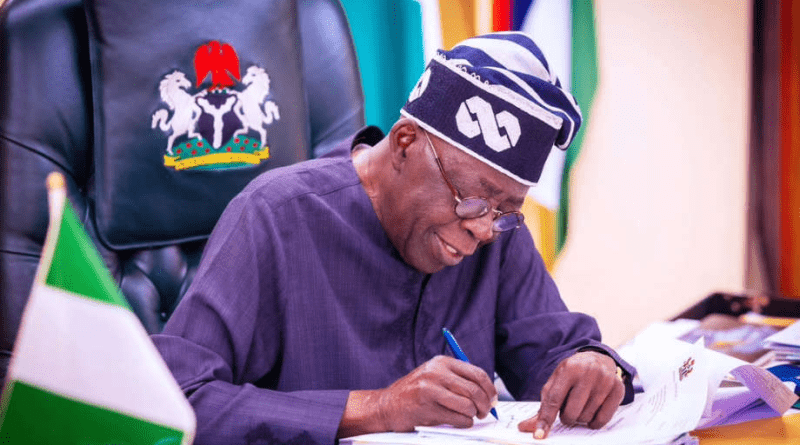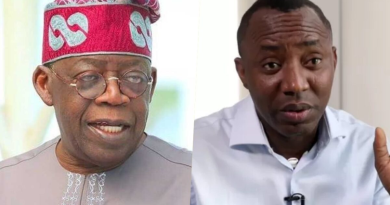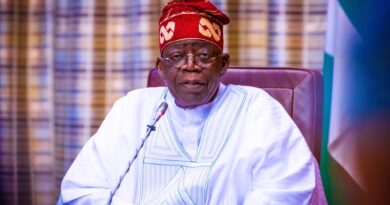Aso Rock Memo Shows Bola Tinubu ‘Very Sad’ Nigerians Call Him ‘T-Pain’ (pics)

President Bola Tinubu has been seething inside the State House after Nigerians lashing out over worsening economic crisis labelled him ‘Tpain’ barely one year into his administration, according to internal memo and aides with direct knowledge of the president’s quandary
During a recent meeting at the Presidential Villa, the president told two guests and aides present that he was “very sad” that Nigerians won’t stop blaming his administration for the raging economic crisis, adding that most citizens would rather ridicule him than offer potential solutions to the country’s challenges, internal notes and our sources said.
“The president has been very sad and not hiding his frustration over how quickly the so-called Tpain label was allowed to spread on social media,” an aide at the meeting told Peoples Gazette. “The president was mostly angry with unpatriotic people who sit on social media to call him names without offering any unique solutions of their own but only to malign the government.”
Another aide subsequently corroborated the account. Both officials sought anonymity to discuss the president’s annoyance with The Gazette, fearing administrative backlash.
One of the officials said the president was not particularly seeking to muzzle speech and other fundamental rights on social media, but only decried the undesired impact of its unfettered deployment on the government’s ability to deliver on its promises without distractions. The Gazette reviewed internal deliberations among a restricted loop of presidential aides where countermeasures against the social media derision of the president were suggested.
“We’re just trying to determine where the campaign to humiliate the president and people working for him is coming from,” the official said. “The president respects the rights of Nigerians to express themselves, but some of us will push back hard against the attackers before they do further damage to the country’s image.”
A presidential spokesman declined comments for this story on Monday morning.
The Gazette could not pin the label to a specific point in time, but it appeared to have gained rapid resonation among Nigerians on social media in recent weeks. It was a play on the first letter of the president’s last name, presumably with inspiration from American rapper Faheem Najm, who goes by the stage name T-Pain.

Some of the earliest uses in reference to Mr Tinubu were tracked to April 2024, but The Gazette noticed that the label spiked around September 16, after a handle on X used it in discussing the president’s arrival in Maiduguri to soothe flood victims that Monday afternoon.
The label has now become a regular feature of social media commentary among Nigerians despite the administration’s efforts to scapegoat some prominent voices on microblogging platform X, formerly Twitter. Pidom Nigeria, an ardent critic of the Tinubu administration known for receiving leaks of vouchers indicating wasteful earmarks at the Presidential Villa, was arrested on August 5, 2024, and held for several weeks by the police, regaining freedom only last week.
Deprecating nicknames have long been assigned to Nigerian leaders, including Ibrahim ‘Maradona’ Babangida and Goodluck ‘Badluck’ Jonathan, but only Mr Tinubu’s has complained about the source of his label: social media.
Mr Tinubu assumed office in May 2023, when the U.S. dollar was exchanging at about N425. The rate has since increased rapidly, peaking at N1,900 at both official and black market bargains last week before after the government launched a nationwide assault on money changers and alleged speculators, which purportedly include cryptocurrency platforms Binance and Coinbase.
Together with the removal of subsidy on petrol, the foreign exchange crisis has led directly to high inflation rates — 38 per cent this year— and fast-spreading hunger among the 200 million-strong population.
Several Nigerian cities, including Kano and Ibadan, held demonstrations throughout August after rice, bread and other basic food items became unaffordable to wage earners and labourers. Nigerian youth employment hovered around 51 per cent when Mr. Tinubu assumed office, and has worsened ever since.
The administration has said it was doing its best to address the crisis, which first became pronounced under President Muhammadu Buhari. New reforms, ranging from the floating of national currency to easing of regulatory red tapes, are being touted as top solutions, although the government acknowledged only results would assuage growing frustration among Nigerians.
Mr Tinubu also announced his administration would intensify roll-out of gas-powered vehicles to reduce transportation costs for the poor, and recently lifted tariffs on imported rice, wheat, among other essential food items.
Still, everyday Nigerians said their patience was wearing thin for Mr Tinubu, who assumed office promising to implement progressive social and economic policies he had preached for decades as a pro-democracy campaigner.



